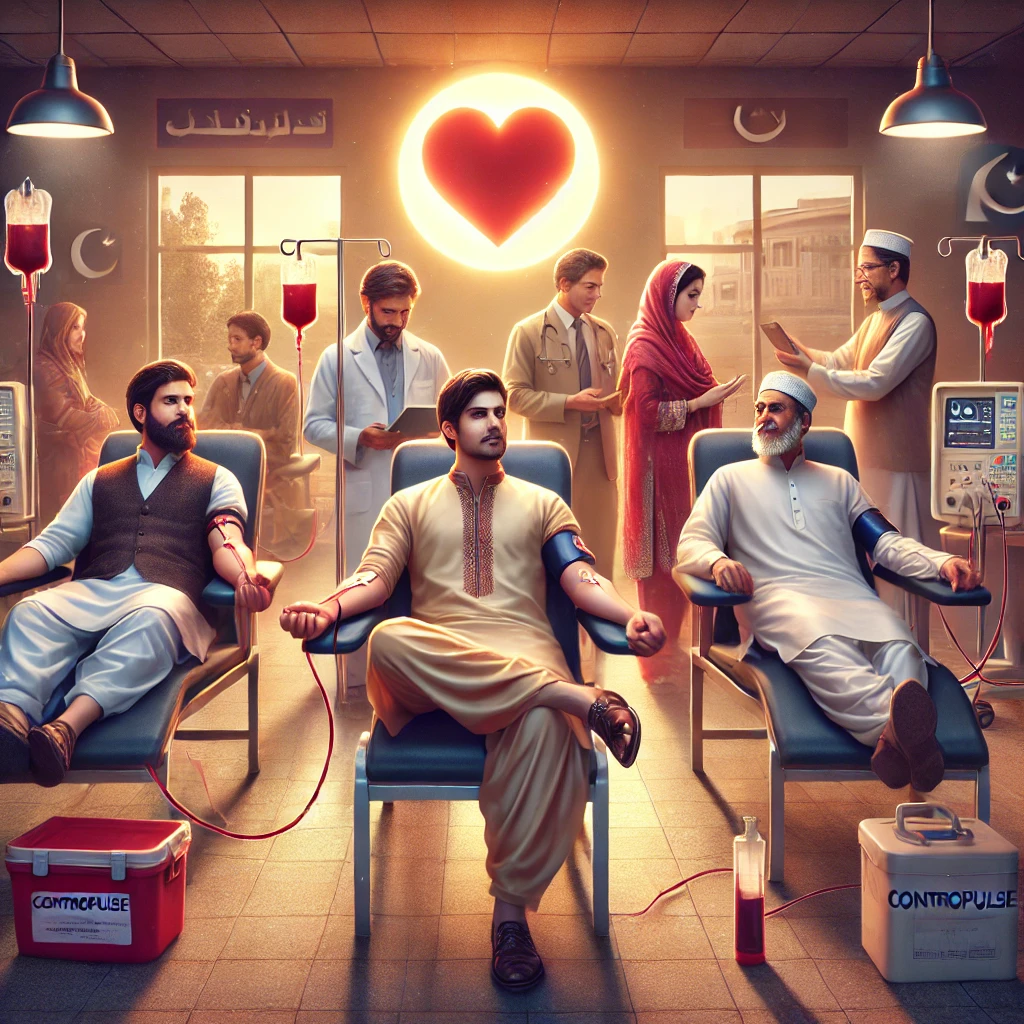Every day, blood donation saves countless lives. Whether it’s for emergency surgeries, cancer treatments, or chronic illnesses, donated blood is a critical resource in healthcare. But did you know that donating blood does not just help recipients, it also offers surprising benefits for donors?
In this blog, we’ll explore the many advantages of blood donation, backed by scientific and medical sources, and answer some common questions about the process. [For a deeper look at common misconceptions, read our companion piece: Breaking the Myths: The Truth About Blood Donation in Pakistan.] (https://contropulse.com/breaking-the-myths-the-truth-about-blood-donation-in-pakistan/)
Save Lives Through Blood Donation
A single blood donation can save up to three lives (American Red Cross, 2022). Blood is essential for:
- Trauma patients (accidents, surgeries)
- Cancer patients undergoing chemotherapy (NIH, 2021) [https://www.nih.org.pk/].
- People with blood disorders like sickle cell anemia (CDC, 2023) [https://www.cdcpakistan.com/assets/uploads/2023/12/CDCPL-REGULATIONS-MASTER-COPY-December-2023.pdf].
- Mothers experiencing childbirth complications (WHO, 2023) [https://www.who.int/news/item/07-05-2024-who-results-report-2023-shows-notable-health-achievements-and-calls-for-concerted-drive-toward-sustainable-development-goals].
By donating blood, you become a silent hero for someone in desperate need.
Health Benefits for Donors by Blood Donation
Donating blood isn’t just altruistic, it’s good for your health too!
Reduces Iron Overload
High iron levels can increase the risk of heart disease. Regular blood donation helps maintain healthy iron levels, reducing oxidative stress (Journal of the American Medical Association, 2012) [https://jamanetwork.com/journals/jama/issue/307/2].
Promotes Cardiovascular Health
Studies suggest that donating blood may lower the risk of heart attacks by improving blood flow (American Journal of Epidemiology, 2015) [https://academic.oup.com/aje].
Free Health Check-Up
Before donating, you receive a mini health screening, including checks for:
- Blood pressure
- Hemoglobin levels
- Pulse rate
- Infectious diseases (like HIV, hepatitis B & C) (FDA Blood Donation Guidelines, 2023) [https://www.fda.gov/vaccines-blood-biologics/biologics-guidances/blood-guidances].
This can help detect potential health issues early.

Emotional & Psychological Benefits of Blood Donation
Knowing that you’ve helped save lives brings a deep sense of fulfillment. Research shows donor’s experience:
- Increased happiness (the “helper’s high”) (Harvard Health, 2020) [https://www.health.harvard.edu/].
- Reduced stress levels
- A stronger connection to their community
Encourages New Blood Cell Production
After donating, your body replenishes lost blood, stimulating fresh red blood cell production (Mayo Clinic, 2023) [https://newsnetwork.mayoclinic.org/discussion/mayo-clinics-strong-performance-in-2023-ignites-healthcare-transformation/].
It’s Quick, Safe, and Easy
- The entire process takes less than an hour (American Red Cross) [https://www.redcross.org/?srsltid=AfmBOopFpwto9XS9i9BNVh9hBnKQshn2Akceh_a4orbQxmui41m3bHdL].
- Only about 1 pint of blood is taken (your body replaces it within 24-48 hours).
- Sterile, single-use needles ensure no risk of infection (WHO, 2023) [https://www.who.int/news/item/07-05-2024-who-results-report-2023-shows-notable-health-achievements-and-calls-for-concerted-drive-toward-sustainable-development-goals].
How Often Can You Donate?
Whole blood: Every 56 days (about 6 times a year) (FDA Guidelines) [https://www.fda.gov/regulatory-information/search-fda-guidance-documents]
Platelets: Up to 24 times a year (since they regenerate faster)
Frequently Asked Questions (FAQs)
Who can donate blood?
Most healthy adults (ages 17-65 in most countries, depending on local guidelines) weighing at least 110 lbs (50 kg) can donate. Some restrictions apply for medical conditions, recent travel, or medications.
Does donating blood hurt?
You may feel a quick pinch when the needle is inserted. However, the donation process itself is generally painless.
How long does it take to recover?
Most people feel normal within 24-48 hours. Drinking plenty of fluids and eating iron-rich foods helps recovery.
Can I donate if I have tattoos or piercings?
In many countries, yes, as long as they were done at a licensed facility with sterile equipment and have fully healed (usually 3-12 months, depending on local regulations).
Is donated blood tested for diseases?
Yes! All donated blood is screened for HIV, hepatitis B and C, syphilis, and other infectious diseases (FDA, 2023)[https://www.fda.gov/drugs/novel-drug-approvals-fda/novel-drug-approvals-2023].
Can vegetarians/vegans donate blood?
Absolutely! As long as you meet hemoglobin requirements, your diet doesn’t prevent donation. Eating iron-rich plant foods (like lentils, spinach, and fortified cereals) helps maintain healthy iron levels.
Why is there always a need for blood donors?
Blood has a limited shelf life:
- Red blood cells last 42 days
- Platelets last just 5 days
- Plasma can be frozen for 1 year
Regular donations are needed to maintain supply.
Ready to donate? Find a blood drive near you and give the gift of life today! ❤





4 Comments